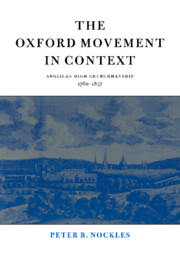Book contents
- Frontmatter
- Contents
- Preface
- List of abbreviations
- Historiographical introduction
- 1 Church and state: the politics of High Churchmanship
- 2 Antiquity and the rule of faith
- 3 Ecclesiology: the apostolic paradigm
- 4 Spirituality, liturgy and worship
- 5 The economy of salvation: sacraments and Justification
- 6 The old High Churchmen and Tractarians in historical relation
- Conclusion
- Select bibliography
- Index
5 - The economy of salvation: sacraments and Justification
Published online by Cambridge University Press: 23 September 2009
- Frontmatter
- Contents
- Preface
- List of abbreviations
- Historiographical introduction
- 1 Church and state: the politics of High Churchmanship
- 2 Antiquity and the rule of faith
- 3 Ecclesiology: the apostolic paradigm
- 4 Spirituality, liturgy and worship
- 5 The economy of salvation: sacraments and Justification
- 6 The old High Churchmen and Tractarians in historical relation
- Conclusion
- Select bibliography
- Index
Summary
HIGH CHURCHMANSHIP AND THE SACRAMENTS IN CONTEXT
It was not immediately clear that Evangelicals as a body would react against the exaltation of sacraments and ordinances in the early numbers of the Tracts for the Times. Differences between the Orthodox and Evangelical parties were primarily confined to the nature of the spiritual effects of the sacraments, though even on this point eirenic voices on both sides were not lacking. One Orthodox churchman in 1833 even asserted in relation to the position of both schools, ‘are not our sentiments upon the efficacy of Baptism, and the sacred obligation of the body and blood of Christ, cast exactly in the same Gospel-mode?’ On the subject of baptism, however, the controversies involving Richard Mant and Thomas Scott in the 1810s and again in the late 1830s between Pusey and Evangelical critics, showed that this was not the case.
High Churchmen faulted Evangelicals for holding that sacraments were little more than that which they signified rather than effectual means of grace. A repudiation of this position was an important element in the theological evolution of both the young Gladstone and Samuel Wilberforce from Evangelicalism to High Churchmanship. According to Gladstone, it was a closer examination of the Occasional Offices of the Prayer Book which ‘opened my eyes’. As Gladstone later recalled, ‘it imparted to the framework of my Evangelical ideas a shock from which they never recovered.
- Type
- Chapter
- Information
- The Oxford Movement in ContextAnglican High Churchmanship, 1760–1857, pp. 228 - 269Publisher: Cambridge University PressPrint publication year: 1994



